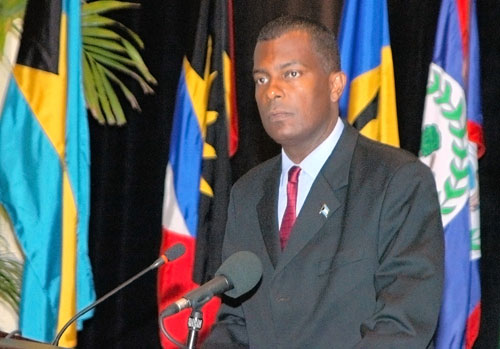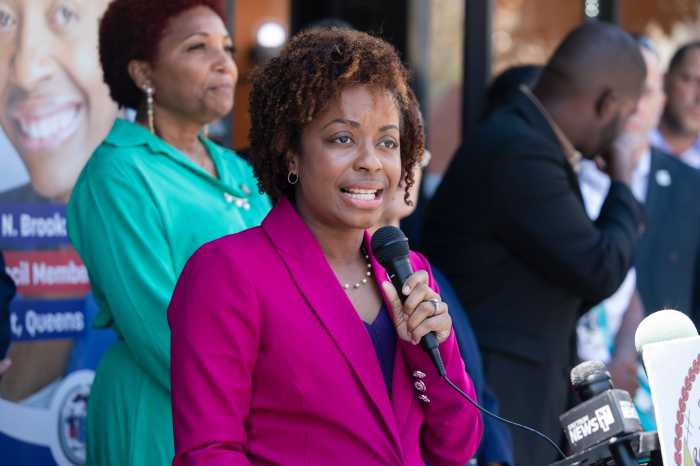As fear pervades the immigrant community in the United States, President Donald Trump has made good on a campaign promise to open an office that deals specifically with assisting what he says are victims of crimes committed by criminal immigrants from the Caribbean and other places.
The Secretary of the US Department of Homeland Security (DHS), John F. Kelly, announced on Wednesday the official launch of the US Immigration and Customs Enforcement (ICE) Victims of Immigration Crime Engagement Office (VOICE).
ICE said it built the VOICE office in response to Trump’s Executive Order entitled, “Enhancing Public Safety in the Interior of the United States,” which directed DHS to create an office to support victims of crimes committed by criminal immigrants.
“All crime is terrible, but these victims are unique – and too often ignored,” Kelly said. “They are casualties of crimes that should never have taken place – because the people who victimized them often times should not have been in the country in the first place.”
ICE said the key objectives of the VOICE office are to “use a victim-centered approach to acknowledge and support victims and their families”; to “promote awareness of available services to crime victims”; and “to build collaborative partnerships with community stakeholders assisting victims.”
The types of assistance people impacted by crimes committed by illegal immigrants can expect include local contacts to help with unique victim requests, ICE said.
It said community relations officers will serve as a local representative explaining to victims what information is available and to help victims understand the immigration enforcement and removal process.
ICE said access to social service professionals will enable victims to obtain resources and service.
The immigration agency said it has a “cadre of 27 victim assistance specialists located across the country available to direct victims to a wide range of resources.”
But immigration advocates in the US describe the institution of VOICE as fear-mongering, pointing to studies that illustrate that immigrants are less likely to commit crimes than native-born Americans.
With more than a half-million undocumented immigrants living in New York City, many of which are from the Caribbean, New York City administration has been strongly opposed to Trump’s immigration policies.
On Wednesday, the City Council began redoubling efforts to protect immigrants from deportation.
Three of its committees held a hearing on nine bills aimed at expanding protections for the city’s undocumented immigrants, as well as Muslims and residents who are gay, bisexual or transgender, according to the New York Times.
“This is how we respond, with legislative fixes, through a public hearing process,” said Councilman Carlos Menchaca, Democrat of Brooklyn, the chairman of the Immigration Committee. “These bills represent the continued outcry of support that our residents are asking for.”
On Wednesday, Mayor Bill de Blasio also announced his own response to the Trump immigration crackdown.
He designated US$16.4 million for immigrant legal services to assist people in detention, children coming to the country unaccompanied and asylum seekers.
In 2014, the Council made New York one of the first cities to enact laws limiting cooperation with US federal immigration enforcement officials in the detention of undocumented immigrants, according to the New York Times.
It said the laws prohibited the Police and Correction Departments from holding inmates for release until ICE could collect them.
The two departments could hold detainees for ICE only after receiving a warrant from a judge, and only those who had committed a violent and serious crime within the previous five years, the Times said.
It said those policies were behind a recent “war of words” between the Trump administration and officials in New York City over its so-called sanctuary city status, with US Attorney General Jeff Sessions asserting that New York was “soft on crime.”
Mayor de Blasio and James P. O’Neill, the police commissioner, forcefully rejected that idea, “and the attorney general backpedaled,” the Times said.
On Wednesday, Lawrence Byrne, the Police Department’s deputy commissioner for legal matters, said ICE had issued 182 detainer requests since the beginning of the year, compared with 72 requests in all of 2016, according to the Times.
Despite the increase under the new administration, Byrne said the department had honored none of the requests.
“Commissioner O’Neill has been very clear that N.Y.P.D. does not do civil immigration enforcement,” Byrne said, adding, however, that the commissioner was equally clear in saying, “If you commit a crime, we’re going to find you.”
On Tuesday, a US federal judge in California sent a strong rebuke to Trump by temporarily blocking his Jan. 25 executive order threatening to withhold some federal funds from cities that refused to cooperate with immigration officials.
With the matter proceeding in court, the City Council looked to bolster the local laws, the Times said, with one bill extending the policy of not honoring ICE requests to the Probation Department.
The proposed law follows on an announcement this week by Brooklyn’s acting district attorney, Eric Gonzalez, that his office would seek alternative prosecutions for immigrants that would not affect their immigration status, the Times said.
























